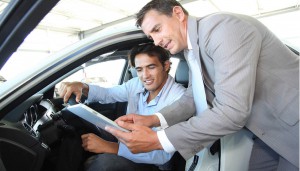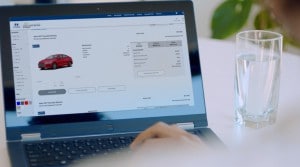
Auto dealers are facing a new sales world. The coronavirus pandemic has killed sales while changing the rules for the transactions completed.
The Sunset Auto Family in Sumner, Washington, has long been that state’s biggest Chevrolet dealer, with a staff of 270 on the sales floor, service shop and back end operations. But owner Bill Mitchell this week had to lay off 200 of those employees as his sales plunged to zero due to the ongoing coronavirus pandemic.
Sunset is by no means alone. Hundreds of dealers across the country are paring back operations or closing entirely as new vehicle sales collapse – industry analysts anticipating March demand will be down around 40% year-over-year, with April expected to see an even steeper 50 to 60% decline. Complicating matters, with residents in many parts of the country facing lockdowns, dealerships are also being ordered to close their showrooms completely in states including Washington, New York, California and Illinois.
But some retailers are looking for ways to keep their businesses going, even under lockdown orders. Retail chains AutoNation and Sonic Automotive, for one thing, are promoting online sales in states where allowed. Carvana, one of the largest used vehicle chains, has launched what it calls a “touchless” delivery process to ease concerns among potential buyers.
(Analysts warn auto sales forecasts looking dire.)
As the U.S. new car market boomed during the years following the Great Recession, employment rose rapidly. According to the National Automobile Dealers Association, there are nearly 1.2 million Americans employed by new car retailers, and estimates run into the many hundreds of thousands more at used vehicle dealerships.
“Total dealership employment has consistently risen every year since the Great Recession,” said NADA Chief Economist Steven Szakaly. “In addition, hundreds of thousands of other local jobs are dependent on dealerships.”
Revenues, meanwhile, top $1 trillion, the average per dealer now estimated at generating sales and other revenues of over $60 million annually, according to NADA.
But with no clear sign as to when the U.S. automotive market will recover, automakers and automotive retailers alike are frantically looking for ways to prop the market up and keep dealerships from folding, as happened in large numbers a decade ago.
More than a dozen manufacturers have now announced programs meant to help current vehicle owners avoid defaulting on current loans. A handful of launched incentive programs to bring in new buyers – GM offering 0% financing for up to 84 months to qualified customers. But the big incentive programs, like those that followed 9/11 and which became frequent during the Great Recession, are likely months away, Tyson Jominy, a J.D. Power analyst, told TheDetroitBureau.com.
For now, the challenge is to reach out to buyers who either can’t, or won’t, come to showrooms.
GM dealers, for one, can take advantage of the automaker’s “Shop-Click-Drive” program which allows them not only to spec out a new vehicle on line but also get a trade-in estimate, line up financing and do just about everything else necessary without setting foot in a showroom.

Using the internet to draw shoppers in as well as complete sales is going to be the new normal for the next few months.
(U.S. car sales verging on Great Recession-level collapse.)
Similar programs are available through some other brands and large chains like AutoNation and Sonic have set up their own online processes.
That would seem only logical in today’s world where online retailers like Amazon have gained so much business that brick-and-mortar stores are struggling to survive. But studies have shown that while the vast majority of new car buyers do their research online, most still want to kick tires before finalizing a deal.
And, ironically, powerful dealer lobbying groups have long pushed back to limit online sales fearing they could face the same fate that has befallen appliance, fashion and other consumer goods retailers. So, laws in many states simply don’t allow a car purchase to be completed without at least some face-to-face time.
Where that is required, dealers who’ve remained open are trying to make the in-person portion of the process short and sweet. And many are offering to deliver vehicles to customers’ homes – sanitizing them upon delivery.
It’s not just new dealers going that extra step. As part of its Touchless Delivery program, Carvana is handling much or all of the sales process online – depending upon location. In turn, there is no direct contact between Carvana staff or customers when it comes time to pick up a trade-in or drop off the vehicle being purchased.
“Our number one priority is the health of our customers and the people we work with. Touchless Delivery allows us to achieve that goal,” said Amy O’Hara, associate director of communications at Carvana.
There are signs these programs may be helping. Carl Black Automotive, which operates five dealerships in Tennessee, Florida and Georgia, had been getting one or two potential customers a day interested in purchasing entirely online, according to a report by the Wall Street Journal. Now, the president of the retailer, Mike Bowsher, says that is up to nearly 10 daily.
Retailers who long tried to limit online sales are now reversing course. After receiving orders to shut down operations in much of the state, the Pennsylvania Automotive Association posted a note on its website saying, “We are looking to get further clarification regarding Internet sales and delivery,” the dealer group hoping the state will loosen up rules, at least temporarily.
(Q&A: J.D. Power’s Tyson Jominy offers a look at what’s ahead.)
For the year as a whole, Power and other analysts believe the U.S. new car market will be off 20% or more as a result of the coronavirus pandemic. Few expect online retailing to salvage auto sales, especially over the next few months, but it could soften the blow, at least a little. Longer-term, it remains to be seen if this marks the start of a broader transformation in how Americans buy their cars, trucks and crossovers.


